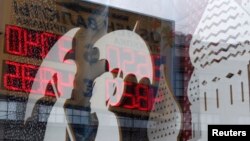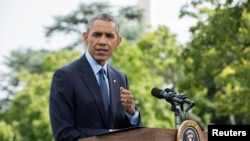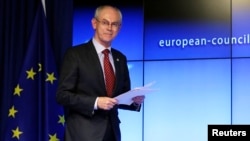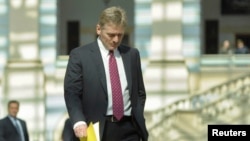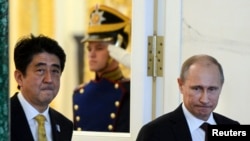The United States is joining the European Union in expanding sanctions against Russia over its role in the conflict in Ukraine.
The announcement of “coordinated sanctions,” which characterizes Moscow’s actions in Ukraine as “illegal” came in a White House statement issued Thursday.
President Barack Obama said new U.S. sanctions against Moscow will be unveiled Friday.
“We are implementing these new measures in light of Russia’s actions to further destabilize Ukraine over the last month, including through the presence of heavily armed Russian forces in eastern Ukraine,” the statement quotes President Barack Obama as saying.
In the document, Obama acknowledges the truce agreement reached last week in Minsk, but says that “we have yet to see conclusive evidence that Russia has ceased its efforts to destabilize Ukraine.
According to the statement, the sanctions will be directed at Russia’s financial, energy, and defense sectors with the objective of imposing “mounting costs" on Moscow.
“These measures will increase Russia’s political isolation as well as the economic costs to Russia, especially in areas of importance to President [Vladimir] Putin and those close to him.”
The statement added that if Russia fully implements its commitments, these sanctions can be rolled back.
EU measures
Earlier Thursday, the European Union announced its own new round of sanctions against Russia, to take effect Friday, also indicating that they may be adjusted depending on the situation on the ground, a top EU official said.
In a statement Thursday, Herman Van Rompuy, President of the European Council, said that before the end of the month a special committee will carry out a comprehensive review of the implementation of the peace plan agreed to last Friday between Kyiv and pro-Russia separatists in Ukraine’s east.
“We have always stressed the reversibility and scalability of our restrictive measures. Therefore, in the light of the review and if the situation on the ground so warrants, [appropriate EU bodies] are invited to put forward proposals to amend, suspend or repeal the set of sanctions in force, in all or in part,” said Van Rompuy.
The EU reached agreement on a new set of sanctions against Russia on Monday.
The new measures, which will primarily target Russian oil and defense firms, also include travel bans and asset freezes for 24 individuals linked to the conflict in Ukraine, according to a separate EU Council statement.
Russia's stock market dropped 0.7 percent on the news, and the ruble fell to an all-time low of 37.51 to the dollar.
Moscow's reaction
President Putin's spokesman, Dmitry Peskov, said Thursday that Russia "regrets" the EU's decision and called the move "illegal," according to Russia's RIA Novosti state news agency.
Peskov added that the EU's action "defies explanation" given what he said were Russia's recent efforts to end the bloodshed in eastern Ukraine, including, President Putin's "peace initiatives."
Separately, Moscow threatened to take retaliatory steps by suggesting the addition of non-food products to its existing list of restrictions, and appealed for “common sense” to prevail.
“We have an entire range of non-agricultural goods, where our partners, primarily our European partners, depend more on Russia than Russia depends on them,” Kremlin economic aide Andrei Belousov said, according to RIA Novosti.
He said the new restrictions could include caps on car imports and on certain types of light industry goods.
Russia has already restricted the import of certain European food products.
“But I hope common sense will prevail and we will not have to introduce those measures,” Belousov added in remarks reported before the EU’s decision to proceed with new sanctions.
New Russia-Japan rift over sanctions?
President Vladimir Putin may delay his visit to Japan because of sanctions Tokyo has slapped on Russia over Ukraine, Moscow's acting ambassador to Japan was cited as saying by Russian state media Thursday.
Japan, acting in coordination with Western countries, last month imposed sanctions on Moscow for its annexation of Ukraine’s Crimean peninsula in March and its role in the separatist rebellion in eastern Ukraine.
“We had built a very clear timetable to prepare for the visit of Vladimir Putin to Japan. Unfortunately that schedule has been moved,” Yevgeniy Afanasiev told Russia's official newspaper Rossiiskaya Gazeta.
He added that Putin himself would decide when and if he would be travelling to Japan.
The two countries are already locked in a territorial dispute over a set of islands Russia seized during World War Two.
In imposing its own sanctions against Russia, Japan joined a list of countries that includes European Union nations, the United States, Canada and Australia. The group was subsequently joined by Switzerland.
Russia has defended its annexation of Crimea as legitimate and consistently denied any role in the conflict in eastern Ukraine.
Some material for this report came from Reuters.




